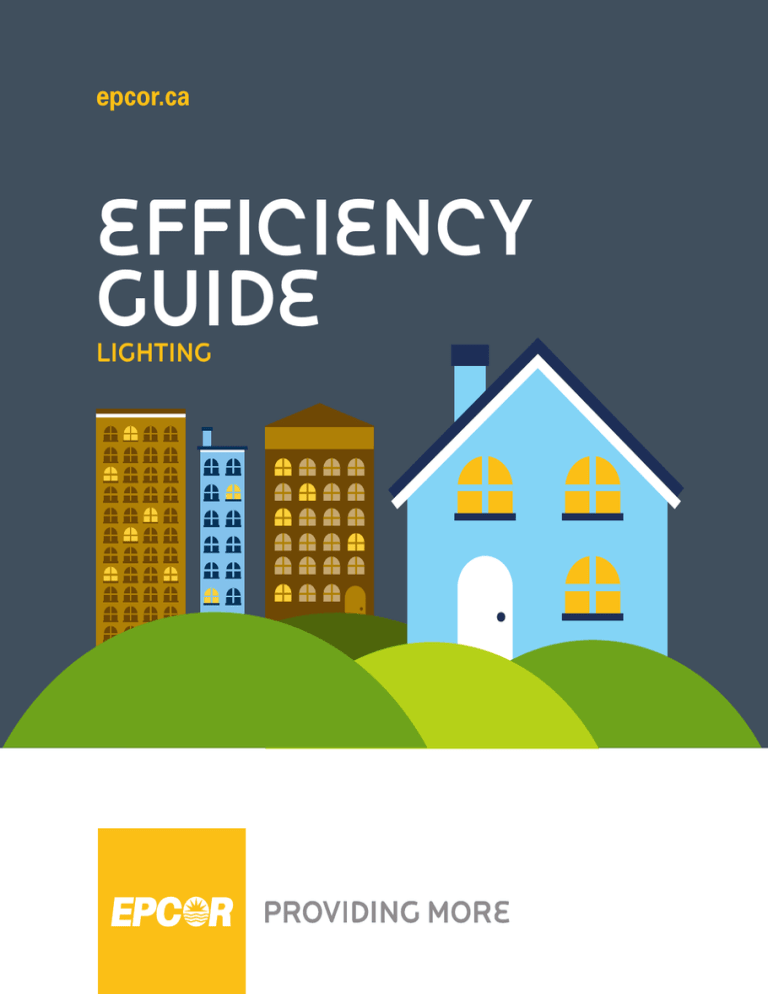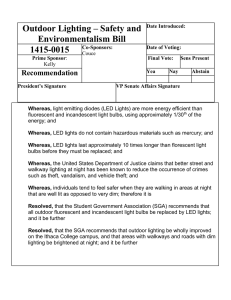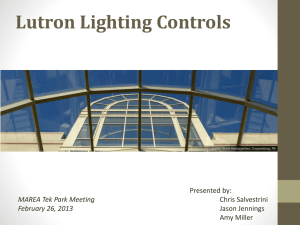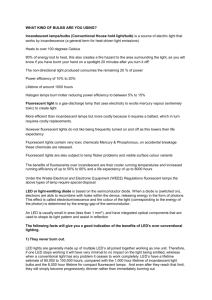EPCOR Efficiency Guide: Lighting
advertisement

epcor.ca eFFiciency guide Lighting tips For lighting eFFiciency Compact Fluorescent lamps (CFLs): • ENERGY STAR qualified CFLs are 75% more efficient than incandescent bulbs while delivering the same output. • The longer you use your incandescent bulbs, the more it is costing you in energy. Don’t wait for them to burn out before replacing them with ENERGY STAR qualified CFLs. DID YOU know? Less than 10% of the energy incandescent light bulbs consume is used for lighting and the remaining 90% is lost as heat. • Regular incandescent light bulbs have changed very little over the past century. Less than 10% of the energy they consume is used for lighting – the remaining 90% is lost in the form of heat. • If every Canadian household replaced just one incandescent light bulb with an ENERGY STAR qualified CFL, it would have the same impact as removing 66,000 cars off the road for one year. Timers, sensors & dimmers: • Dimmers on your lights can help save energy, increase the life of the bulbs and add various lighting levels to your room. They also add variety to your room by allowing you to vary the level of light to suit your needs. Ensure that the lights used are rated for dimmers. • Look for dimmers that allow a full range of dimming, and don’t buy bulbs that are brighter at full power than you need. Do not use compact fluorescents with standard household dimmers unless they are rated to function with dimmers. • Consider replacing ordinary wall switches with hi/low switches, which have three settings: full brightness, one-third brightness and off. Make sure these switches don’t use resistors, or you won’t save energy. • Consider installing other interior devices including timers that automatically turn lights on and off after a set period of time or motion sensors that turn lights off when a room is unoccupied. energy eFFicient recessed and track lighting: • Track lighting is useful in locations where lights need to be aimed at different angles and where the position of the light may need to be changed often. Be sure to use CFLs for energy savings over incandescent bulbs. LeDs (Light emitting Diodes): • Make your holiday displays look great while being energy efficient with LED light strings. LED lights use up to 90% less energy than incandescent holiday lights and don’t burn hot, so the fire hazard is significantly lower. • The amount of energy consumed by just one 7-Watt incandescent bulb, the kind used on traditional holiday lighting strings, is the same used by 140 LED bulbs – enough to light two 7.3-metre strings. Outdoor lighting: • Use motion sensor lighting to illuminate the entrances to your home – this is especially useful for safety and security. Apart from buying energy-efficient fixtures and lamps, you can save energy and money by following these steps in lighting your home: • Use natural daylight from windows and skylights whenever possible. • Consider installing solar tube day lighting in washrooms with easy access to the roof. Solar tubing brings daylight through a reflective tube into rooms with no windows. • Turn lights off when they are not in use. This applies to fluorescent as well as incandescent lamps. If you are out of a room for more than 10 minutes, switching off a fluorescent light will save energy and lamp life. However, don’t switch fluorescent lights on and off repeatedly or lamp life will be reduced. • Keep your lamps and fixtures clean. Dirt reduces light levels, which can lead to extra lights being switched on or higher wattage lamps being used. Drip-dry plastic parts to reduce static buildup, which can attract dust. • When cleaning, unplug the fixture or turn the power off. • Avoid having too many lights controlled by a single switch (this can result in having lights on where and when you don’t need them). Switches should be visible and easily accessible. • When redecorating, remember that white walls and ceilings will reflect about 80% of the light that strikes them, whereas black surfaces reflect only about 10% of the light. In other words, you will need brighter lights in a room with a dark decor than in a room with white surfaces. • Place floor lamps or table lamps in a corner instead of in the middle of a wall. This will allow them to reflect light from two walls, giving you more usable light for your money. epcor.ca



